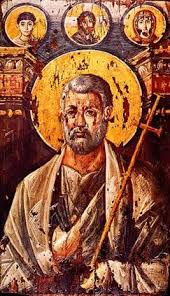 On February 4th we read the entire third chapter, verses 1 to 18, of 2 Peter. The letter was probably written between the years 80 and 90.
On February 4th we read the entire third chapter, verses 1 to 18, of 2 Peter. The letter was probably written between the years 80 and 90.
Part of the second chapter, verses 9 to 22, is read on February 3rd. Here we find a strong warning against false teachers. These are people who, though they accepted the Christian faith themselves, are now finding it difficult to adhere to Christianity’s strict moral teachings while living in a far more permissive pagan society. So they are attempting to downplay those teachings, minimizing their importance. They are working to convince other Christians to go along with their ideas.
The words Peter uses to describe them and their efforts are unequivocal. They are “waterless springs and mists driven by a storm,” and they speak “bombastic nonsense.” He compares them to a sow that is washed, only to wallow in the mud. They are “blots and blemishes, revelling in their dissipation.” The danger of their malicious behavior is that they “entice unsteady souls.”
To emphasize the danger, Peter writes of them that “bold and willful, they are not afraid to slander the glorious ones.” At first reading, we might think that he is saying that they defame the angels who do God’s will. But in fact, he is accusing them of doing something even more serious. The “glorious ones” here are the powers that work against God. By slandering them, or disrespecting their power, the false teachers do something that even God’s angels fear to do: “The angels, though greater in might and power, do not bring against them a slanderous judgement from the Lord.” The false teachers “slander what they do not understand,” and in so doing they bring a terrible penalty not only on themselves but on those they can lure into following them.
In describing their fate, Peter reminds his readers of the story, in Numbers 22, of a soothsayer named Balaam. He is hired by the Moabite king to pronounce a curse on the Israelites.
Balaam is riding on his donkey and doesn’t see the angel of the Lord standing in his path with a sword. But the donkey sees the angel three times, and stops. Balaam strikes the animal, still failing to see the angel blocking his path. Finally God makes the donkey speak, and makes Balaam realize that he is to bless, not curse, the people of Israel.
In the letter’s third chapter, Peter writes that some scoff at God because they don’t see the fulfillment of the “promise of His coming.” But Peter says that God is not slow. Rather, He is patiently giving all of us time to repent. We can trust Him to know when the “Day of the Lord” should come.
There are still “glorious ones” in the world that beckon us with power beyond our ability to understand. Scoffing at that power is still mortally dangerous. But God will always try to save us, even by the embarrassing strategy of making a donkey smarter than we are.
